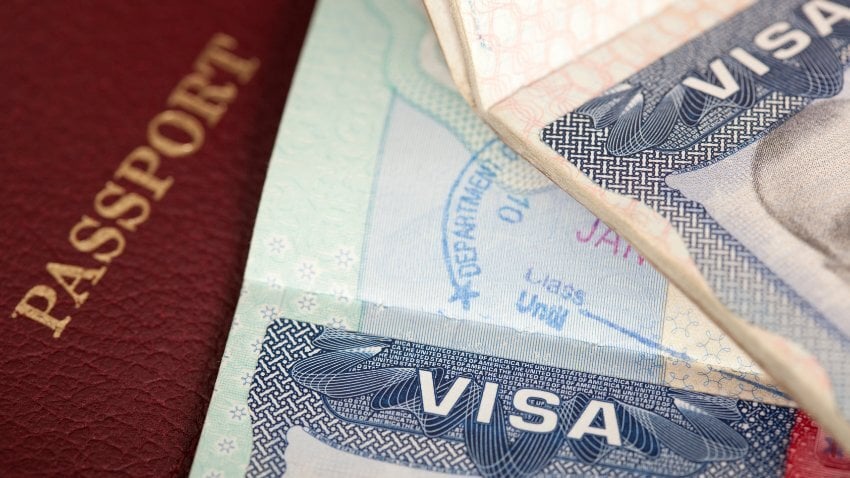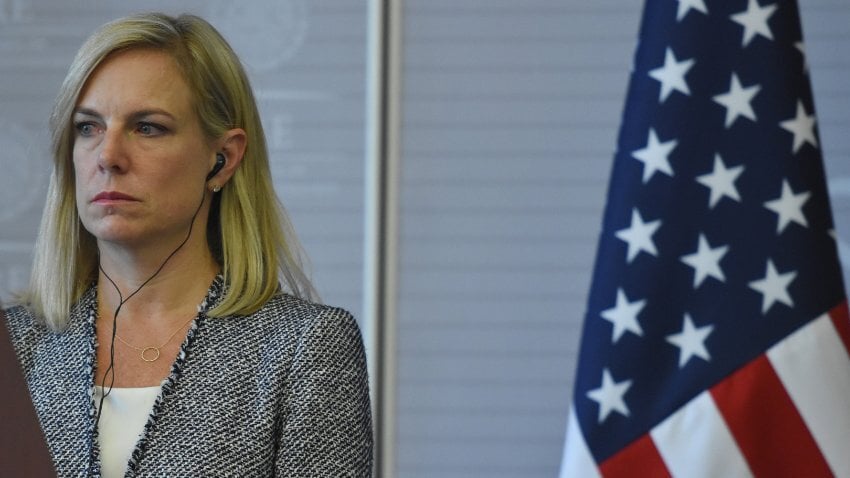Best Cities To Live In Mexico In 2026
Mexico remains one of Latin America’s most compelling destinations, especially for North Americans. More than a million expats call it home, and tens...

5 min read
On July 28, 2025, the Argentine government formally began the process of rejoining the U.S. Visa Waiver Program (VWP). This move could significantly reshape the country's international mobility profile.
The announcement came during a high-level visit by U.S. Secretary of Homeland Security Kristi Noem to Buenos Aires, where she met with Argentine officials and signed a formal agreement to initiate the evaluation process.
This marks Argentina’s first step toward rejoining the VWP after being removed in 2002, signalling a new phase of trust and cooperation between the two governments. The timing is no coincidence. With Donald Trump back in the White House and Javier Milei advancing a bold realignment toward freer markets, both administrations appear eager to deepen bilateral ties, and the Visa Waiver Program is now central to that agenda.
In this article, we’ll explore what the VWP is, why Argentina’s re-entry matters, how its new CBI program enhances the country’s global positioning, and what all this means for expats, investors, and internationally minded individuals seeking opportunity and mobility in Latin America.

The U.S. Visa Waiver Program lets citizens from approved countries visit the U.S. for up to 90 days without a visa, using an ESTA instead—fast, affordable, and a sign of diplomatic trust
The U.S. Visa Waiver Program (VWP) is a U.S. government initiative that allows citizens of approved countries to travel to the United States without obtaining a traditional visa, as long as the visit is for tourism, short-term business, or transit, and does not exceed 90 days. Instead of going through the usual consular process for a visa, eligible travellers simply complete an online application called ESTA before departure, making the process significantly faster, cheaper, and more efficient.
The ESTA is a digital travel authorization valid for two years, allowing multiple entries and costing around $21 USD. While not a visa, ESTA functions as a low-friction layer of border control and must be obtained before boarding. Approval is usually swift, but final entry permission remains at the discretion of U.S. Customs and Border Protection upon arrival.
As of 2025, around 40 countries participate in the program, including high-trust nations like Japan, Germany, the United Kingdom, and Chile, which remains the only Latin American country currently admitted. Entry into the VWP is not automatic — it is based on a country meeting strict security, immigration control, and data-sharing standards.
Being included in the Visa Waiver Program is more than a travel convenience; it represents a form of diplomatic trust. It signals that the United States considers the country a stable partner, with low visa overstay rates, effective law enforcement collaboration, and the technical capacity to issue secure biometric passports. For countries like Argentina, gaining access to the VWP serves as both a practical benefit for its citizens and a strategic upgrade in its international standing.

For Argentina to join the U.S. Visa Waiver Program, it must cut its visa refusal rate below 3%, issue secure biometric passports, share security data, and maintain strong border and law enforcement
Gaining entry into the Visa Waiver Program is a complex, multi-year process, and the U.S. has a strict set of eligibility criteria. For Argentina to be approved, it must meet the following key requirements:
Low Visa Refusal Rate: Argentina’s visa refusal rate must be under 3%. As of 2024, it was still above 8%, meaning further improvement is needed.
Secure Passports: The country must issue biometric, machine-readable passports that meet U.S. standards for identity and fraud prevention.
Information Sharing Agreements: Argentina must enter into agreements with the U.S. to share security, criminal, and immigration-related data to assist with screening and enforcement.
Low Overstay Rate: The percentage of citizens who overstay their allowed period in the U.S. must be minimal. Argentina already performs well here, with an overstay rate below 1%, the lowest in Latin America.
Internal Security Measures: The U.S. will evaluate Argentina’s internal law enforcement capabilities, airport and border security, and ability to track and prevent terrorist threats.

Kristi Noem, U.S. Secretary of Homeland Security, visited Buenos Aires and met with Argentine officials
The signing of the statement of intent by Secretary Kristi Noem and the Argentine government officially launches a multi-stage review process under the oversight of the U.S. Department of Homeland Security.
This phase involves close coordination through working groups, regular technical audits, and progress tracking on the following:
Data sharing systems for watchlists and criminal records
Use of biometric e-passports and fraud-prevention infrastructure
Passenger screening and counterterrorism capabilities
Legal harmonization on migration and identity control
Argentina has already made significant strides in these areas, and DHS officials publicly acknowledged the country's remarkable cooperation in law enforcement and counterterrorism efforts.
However, the most challenging metric remains the visa refusal rate, which must be brought below 3%. This is where Argentina must prove that its internal documentation systems and visa applicants are low-risk and credible in the eyes of U.S. consular officers.
The timeline for approval is estimated at 24 to 36 months, but momentum is on Argentina’s side. The diplomatic tone is positive, the technical groundwork is advancing, and the political will exists on both sides to make this happen.
Argentina previously participated in the VWP between 1996 and 2002, but was removed following its economic collapse and an increase in visa overstays during the early 2000s. Since then, Argentine citizens have needed to apply for standard B1/B2 visitor visas — a process that involves in-person interviews, fees, and wait times.
Under President Javier Milei, Argentina is seeking to reposition itself on the world stage. With a bold reform agenda at home and increasingly close ties with the United States — particularly the Trump administration — the country is pushing to restore its credibility as a stable and trusted partner.
Rejoining the VWP is a cornerstone objective of this diplomatic realignment, and one that carries tangible benefits for both citizens and international investors.
If Argentina is accepted into the VWP, the impact will be immediate and meaningful:
No more B1/B2 visas for short-term travel
Faster, cheaper access to the U.S. for millions of Argentine citizens
Increased appeal of the Argentine passport for global investors
A major diplomatic win for the Milei administration
Potential to inspire other Latin American nations to pursue VWP inclusion
For Argentines with business ties, family in the U.S., or regular travel needs, this shift will remove a major bureaucratic hurdle and signal Argentina’s return to a category of nations trusted by the United States.
%20program%20%2c%20which%20gives%20investors%20the%20chance%20to%20obtain%20a%20second%20passport%20through%20direct%20investment%20in%20the%20country.jpg?width=850&height=478&name=Argentina%20has%20also%20launched%20a%20Citizenship%20by%20Investment%20(CBI)%20program%20%2c%20which%20gives%20investors%20the%20chance%20to%20obtain%20a%20second%20passport%20through%20direct%20investment%20in%20the%20country.jpg)
Argentina’s bid for the U.S. Visa Waiver Program signals a major pro-liberty shift under Milei, pairing free-market reforms with global mobility. If approved, its passport’s value will soar for travellers and investors
Argentina’s push to join the U.S. Visa Waiver Program is more than just a travel perk; it’s a clear sign of serious geopolitical realignment. Under President Javier Milei, Argentina has embraced free-market principles, limited government, and Western partnerships, turning away from the tired socialist playbook that has held back much of Latin America for decades. His administration is now working closely with Donald Trump’s White House to rebuild trust, restore credibility, and re-enter the circle of nations that the U.S. actually respects.
Argentina has also launched a Citizenship by Investment (CBI) program, which gives investors the chance to obtain a second passport through direct investment in the country. If Argentina gains access to the Visa Waiver Program, it will become one of the only countries in the world offering CBI plus visa-free travel to the United States. That’s a game-changer.
This is the kind of opportunity serious global citizens are looking for, not just another passport, but a tool for real freedom, increased mobility, and geopolitical advantage. Argentina is emerging as one of the few jurisdictions in Latin America that understands what expats and international investors want: open access, low bureaucracy, and pro-liberty leadership.
Argentina’s bid to join the U.S. Visa Waiver Program is more than a bureaucratic move; it’s a symbolic and strategic shift toward greater liberty, global mobility, and international cooperation. Already ranking among the strongest passports in Latin America, Argentina offers visa-free or visa-on-arrival access to 170 countries. If the U.S. waiver is approved, it would further boost the passport’s value, making it one of the most powerful travel documents in the Western Hemisphere.
For travellers, investors and expats, this move could unlock significant new opportunities. While the full process will take time, the signal is clear: Argentina is once again open for business, investment, and global movement. We’re keeping a close eye on how the country evolves, and you should be too.
If you’re looking for a solid Plan-B but don’t know where to start, subscribe to our newsletter and download your free special report, Plan-B Residencies & Instant Citizenships.
If you want the best intel from the expat world, including profitable offshore opportunities, little-known tax-saving strategies, and hard-won insights on immigration, passports, and Plan-B residencies, all delivered to your inbox every single week, then join our daily correspondence, EMS Pulse®. Currently enjoyed by over 84,000 expats and expat-hopefuls worldwide. Fill in the form below to join our newsletter free:

Written by Mikkel Thorup
Mikkel Thorup is the world’s most sought-after expat consultant. He focuses on helping high-net-worth private clients to legally mitigate tax liabilities, obtain a second residency and citizenship, and assemble a portfolio of foreign investments including international real estate, timber plantations, agricultural land and other hard-money tangible assets. Mikkel is the Founder and CEO at Expat Money®, a private consulting firm started in 2017. He hosts the popular weekly podcast, the Expat Money Show, and wrote the definitive #1-Best Selling book Expat Secrets - How To Pay Zero Taxes, Live Overseas And Make Giant Piles Of Money, and his second book: Expats Guide On Moving To Mexico.

Mexico remains one of Latin America’s most compelling destinations, especially for North Americans. More than a million expats call it home, and tens...

South Korea is far more than K-pop and K-dramas. It is a country known for outstanding food, from bustling street markets to high-end dining, as well...

Asia is one of the most fascinating regions in the world for travel, offering an extraordinary mix of cultures, histories, and landscapes. From...